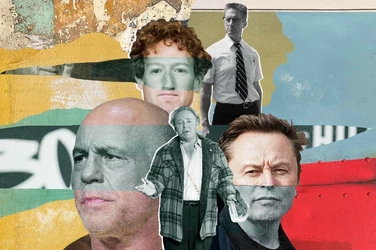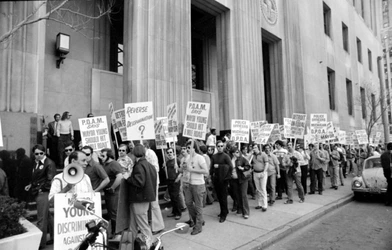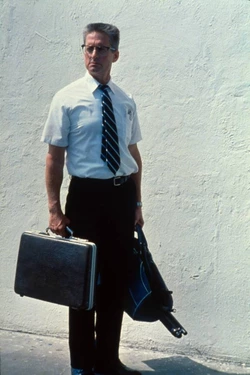
Avatars of ‘masculine energy,’ clockwise from left: podcaster Joe Rogan, Meta CEO Mark Zuckerberg, actor Michael Douglas in ‘Falling Down,’ Tesla CEO Elon Musk, and actor Carroll O’Connor as Archie Bunker in ‘All in the Family.’ Photo Illustration: Dana Smith
By Joanne Lipman
Feb. 28, 2025 9:55 am ET
The manosphere won. Bro podcasters top the charts. Meta’s Mark Zuckerberg declares his company needs more “masculine energy.” Elon Musk shares a post saying only “high-status males” should run the country. The White House kills diversity, equity and inclusion (DEI) policies, and so do multiple companies, from Target to McDonald’s.
OK, men, so will you finally quit complaining?
In 2021, Joe Rogan famously said, “It will eventually get to straight white men are not allowed to talk…It will be, ‘You’re not allowed to go outside’…I’m not joking. It really will get there, it’s that crazy.” But Rogan’s complaint is actually an old one that has exploded as a rallying cry every decade or so for more than 50 years. White guys have blamed others for their job losses, educational failures, economic problems and drug addictions.
Somebody else is always at fault. The mighty white guy, it turns out, is quite the delicate flower.

‘It will eventually get to straight white men are not allowed to talk,’ said Joe Rogan, seen here in 2024. Photo: mark j. rebilas/USA TODAY Sports
“The white male is the most persecuted person in the United States,” a retired marketing executive declared in a Newsweek cover story in 1993. The magazine cataloged a litany of white men’s gripes: a culture that demonized them, diversity programs run amok, women and Black people getting jobs that were rightfully theirs. “This is a weird moment to be a white man,” it reported. “Suddenly white American males are surrounded by feminists, multiculturalists, P.C. policepersons, affirmative-action employers…all of them saying the same thing: You’ve been a bad boy.”
Sound familiar?
Racism and sexism are as old as time. But the “oppressed white man” trope is a relatively modern invention, with roots in the civil-rights and women’s-rights victories of the 1960s. Protests and lawsuits followed, with aggrieved white men turning the language of civil rights on its head. “Talk about rights; we’ve got no rights!” a crowd of white Detroit police officers chanted in 1975, protesting a court ruling in favor of the department’s relatively few Black and female officers.
The TV character Archie Bunker, the oppressed white guy’s avatar, captured that spirit in a 1974 “All in the Family” episode, when he complained about a female colleague whose pay was equal to his: “What’s the point of a man working hard all his life, trying to get someplace, if all he’s gonna do is wind up equal?!”
This isn’t to minimize the real social changes in those years. U.S. manufacturing jobs peaked in 1979; as they declined, white men without college degrees lost opportunities for a robust middle-class life. At the same time, women began earning more college degrees than men, more women and people of color entered the workforce, and the American population as a whole became more ethnically diverse.
But let’s put those changes in perspective: White guys still had it better than almost anybody else. In the 1980s, the unemployment rate for white men was less than half of that of Black men, and white men overall still outearned other groups.

Detroit police officers protest ‘reverse discrimination’ in May 1975 Photo: Walter P. Reuther Library, Archives of Labor and Urban Affairs, Wayne State University
Yet the aggrieved white guy kept making a comeback. He enjoyed a peak cultural moment in the 1990s, when he was threatened by a recession, a diversifying workforce and a growing focus on sexual harassment. Men felt targeted by “the finger of feminist accusation,” as the New York Times put it in 1994. On screen, they had morphed from the wise patriarch of “Father Knows Best” into idiots, as in the TV show “Married with Children,” or louts, as in the hit movie “Thelma and Louise.” They felt insulted by a culture that seemed to venerate women and minorities while mocking them.
Their angst spawned a new genre of male crisis literature. Bookstore shelves were crammed with titles like “Not Guilty,” “Myths of Masculinity” and “The End of Manhood.” In his 1993 bestseller “The Myth of Male Power: Why Men are the Disposable Sex,” Warren Farrell asserted that men are “the new n——s” and argued that sexual harassment legislation creates a “hostile environment” for men.
When Republicans won control of the House in the 1994 midterms, a USA Today headline coined a now-familiar phrase: “Angry White Men: Their Votes Turn the Tide for GOP.” The angry white man even got his own revenge fantasy with the 1993 film “Falling Down,” in which Michael Douglas played a laid-off defense worker. Enraged at becoming “obsolete,” he goes on a murderous rampage, attacking everybody in his way. The movie ends with him asking, incredulously, “I’m the bad guy?”


Left: Carroll O'Connor as the aggrieved Archie Bunker in the TV series 'All in the Family.' Right: The decline of manufacturing jobs in the 1970s meant fewer economic opportunities for men.CBS Photo Archive/Getty Images; H. Armstrong Roberts/ClassicStock /Getty Images
To be clear, white guys aren’t all sexists or racists or whiners, nor do all—or even most—buy into the white-guy persecution complex. But by the 1990s, the male archetype had been forged, and he would resurface again. Before long he was a fixture in popular culture, personified in the 1999 film “Fight Club” by Brad Pitt’s violent antihero Tyler Durden, who describes men as “the middle children of history, man. No purpose or place…we’re very, very pissed off.”
The beleaguered white guy came roaring back again in the wake of the 2008 financial crisis, when college-educated white guys who had weathered previous recessions just fine—even Wall Streeters!—suddenly took a hit. “The Beached White Male” blared a 2011 Newsweek cover story, which chronicled the woes of the man who “used to have a big job” but now is “all washed up, and doesn’t have a freakin’ prayer.” Among other indignities was the threat to men’s masculinity, with wives forced to work longer hours and husbands feeling less sexy in the bedroom.


Icons of angry masculinity, Brad Pitt in "Fight Club," left, and Michael Douglas in "Falling Down."20th Century Fox/Everett Collection; Warner Bros/Everett Collection
With white guys now dominating government, popular culture, the airwaves and our brain space, it’s puzzling why the victim mentality still persists. The cries that DEI has somehow ruined white men’s lives are particularly head-scratching considering that, as a recent Wall Street Journal analysis revealed, corporate diversity initiatives have had relatively little impact on the workforce.
Yet white guys are still insisting that they’re being terrorized by the scary DEI monster, blaming it for everything from the California wildfires to the Potomac plane crash to the Francis Scott Key Bridge collapse. And the most powerful and privileged among them continue to complain the loudest.
Really, guys? Enough already.
Joanne Lipman is the former chief content officer of Gannett and editor in chief of USA Today. She is the author of “Next! The Power of Reinvention in Life and Work.”
Illustration photos: Clockwise from left: Carmen Mandato/Getty Images; Kenny Holston/Press Pool; Warner Brothers/Everett Collection; Nathan Howard/Reuters; CBS/Getty Images
Source (Archive)






